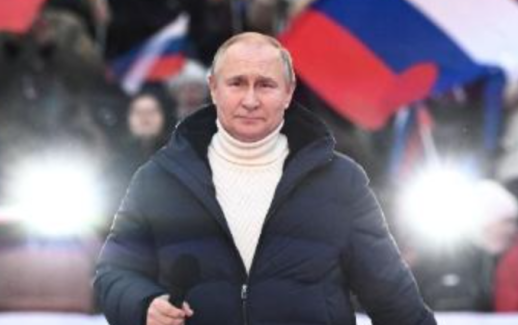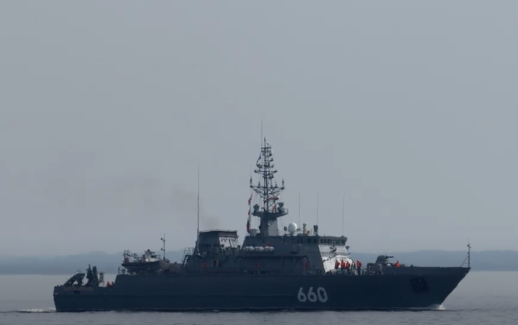Designate Wagner Group and Putin Regime as a Transnational Terrorist Joint Venture in Ukraine
Ukraine and similarly situated independent states on Russia’s periphery suffer under the U.N. fiction that international humanitarian law (law of war or IHL) governs to protect them from a U.N.S.C. veto-wielding Russia while it is under the sway of Putin’s expansionist regime. It does not. The buck has never stopped on a despotic Russian veto holder’s desk.
Yet the Putin regime uses terrorist bombings against Ukrainian civilians, civilization, sovereignty, and infrastructure under the false pretext of “armed conflict” for Russia’s “defense” with impunity. The only way IHL can govern Russian regime aggression is for other U.N. members to fight a World War against Russia and any partners joining it, to force nuclear Russia into trials of its leaders and their underlings in a try for justice. The absurdity of that course makes the “governance” of IHL a case of dishonest illusion.
There is a third way, however, with incremental, collective nation state aid to Ukraine’s defense rooted in counter-terrorism treaties applied in view of the above. These treaties would enable multiplication of direct, collective treaty state action against accomplices, suppliers, and proxies to Russia’s terroristic bombing of Ukraine. Conventional military aid to Ukraine to repel Russia’s invasion would come under collaborative counter-terrorist treaty enforcement as “necessary force.” Necessary force, given the mismatch in numbers between the Russian aggressor and defender Ukraine would include substantial defensive, combat airpower.
For years, Vladimir Putin’s regime has elevated, used in concert with military forces, benefited from, and rewarded Wagner Group as the group committed atrocities and war crimes in service to Russia’s aggression against Ukraine’s sovereignty and people. Globally, Wagner was also used in Venezuela, Libya, Sudan, Mali, and elsewhere in support of Putin regime foreign policy. The Putin governing regime can clearly and credibly be charged with ownership or partnership with the Wagner Group.
Only after Wagner Group’s leader, for real or in pretense, began undermining the regime’s authority did Putin and the Russian Ministry of Defense make a show of disseminating a fog of implied and express disclaimers and praises of and for Wagner Group. Also, Wagner Group’s leader Yevgeny Prigozhin has now claimed that Wagner will no longer recruit Russian prisoners, possibly trying to distance Wagner from state partnership and so rehabilitate the Putin regime’s legitimacy.
The disclaimers are illegitimate and cannot excuse the Putin regime’s illegal ownership of Wagner Group’s activities nor the effect of that ownership on the legitimacy of the Russian Armed Forces’ (including GRU) activities in the ongoing, rolling aggression inside Ukraine.
In the geopolitical case of aggression against sovereign Ukraine and its people, the Putin regime, by commingling Wagner Group and the Russian Armed Forces’ activities and authority, has not only invited designation of Wagner Group as a terrorist entity but by association, the Putin regime as a partner, joint-venture, agent, and sponsor of a terrorist entity. As such the Putin governing regime has arguably demoted itself and Russian armed forces into terrorist entities within the Ukraine aggression based on its conduct as evinces the regime’s intent, not only its words or representations.
In a previous policy advocation piece, we analyzed the above facts to support the application of the International Convention for the Suppression of Terrorist Bombings to the Putin regime’s militant, terroristic aggression against Ukraine and its civilians, civilization, and sovereignty; and, by association, Moscow’s kinetic (including nuclear) and non-kinetic threats to all Convention states supporting Ukraine’s rightful, legal self-defense to try to compel them to act or refrain from acting within their sovereign rights to supply Ukraine’s military and civilian defense.
The Convention’s Article 6(2)d recognizes treaty member jurisdiction where the terrorist bombing is: “committed in an attempt to compel that State to do or abstain from doing any act,” here, to guarantee never to offer Ukraine membership in NATO; and to abstain from supplying Ukraine with military or civilian aid that could cause Russia’s invasion to be unsuccessful; and more. Wagner Group’s leader has also sent an EU Convention state’s government a threat in the form of a blood-stained sledge hammer Wagner has reportedly used to execute those who ‘betray’ Russia.
While Wagner has currently been designated as a transnational criminal organization by the U.S. Treasury Department, Wagner Group’s activities on the battlefields of Ukraine have been terroristic, criminal, and non-defensive in nature and purpose. Therefore Wagner Group should be designated as a terrorist entity with Putin’s complicit governing regime as a hybrid extra-legal non-state controller of Russian power, and as a quasi-state-sponsor of terrorism.
Wagner Group falls short of the professional military and private company labels it uses to distinguish itself from the Russian regime due to its functions as a criminal enterprise and terroristic entity.
Again, in greater detail, the implications and argument for application of the International Convention for Suppression of Terrorist Bombings to Russia’s militant and private terrorist forces in Ukraine, is here: Supply Suppression Strategies… It is a long piece requiring focused reading and consideration of the plain meaning of the conditional language, definitions, and advice and consent communications surrounding the treaty. It also requires comparing Russian conduct with those standards, definitions, and conditions to which treaty members agreed. Finally, it recognizes that Russia is unaccountable under the U.N.’s international humanitarian law (law of war) due to its U.N. Security Council Veto.
Putin’s abuse of Russian territory and military assets for staging and execution of terroristic operations arguably opens Russia’s global weapons and war logistics proxies and suppliers to terrorist suppression enforcement under the Convention. It also reasonably opens Russian territory abused for support of terrorist activities in Ukraine to counter-terrorism activities by Ukraine with sufficient Convention states’ supplies of arms and airpower assets, supplies, and capabilities to decisively suppress Russian terrorist bombing as covered by the Convention.
The Convention for Suppression of Terrorist Bombings impliedly requires state military activity to meet a specific definitional standard in the treaty for it to be excepted from the Convention’s terrorist suppression enforcement authority by other nation states. The Putin governing regime’s activities and that of their state military instrument of power mongrelized with Wagner Group’s authority and terrorist character utterly falls short of that definition of a state military described in the Convention:
As one CSIS report found:
The Russian constitution specifically stipulates that all matters of security and defense belong solely to the state. Consequently, the establishment of private military companies is illegal in Russia, despite repeated efforts of certain powerful groups to change that. Pro-legalization arguments mostly center around the wide international practice of using PMCs, which would justify Russia doing the same. According to news reports, however, the Ministry of Defense, the Ministry of Foreign Affairs, and other security agencies are strongly against lifting this ban.
Because of its subjugation and commingling of the Russian military units in Ukraine and the illegal mercenary organization Wagner Group, Putin’s Ukraine forces failed the Convention’s definition of “Military forces of a state” under its internal law for the primary purpose of national defence or security and persons acting in support of those armed forces who are under their formal command, control and responsibility. Russia’s internal law forbade what Putin did and Moscow has both implied and denied that Wagner Group is under the command, control, and responsibility of the Russian armed forces.
Admission and denial of Wagner Group has the same effect of delegitimizing the Putin regime partnership and combination of Wagner Group with units of the Russian military forces. This, without a clear command structure defining the relationship. Moscow has thus invited enforcement of the counter-terrorism Conventions by treaty member states whose jurisdiction under the treaty and their own domestic laws the Russian regime’s behavior has triggered.

